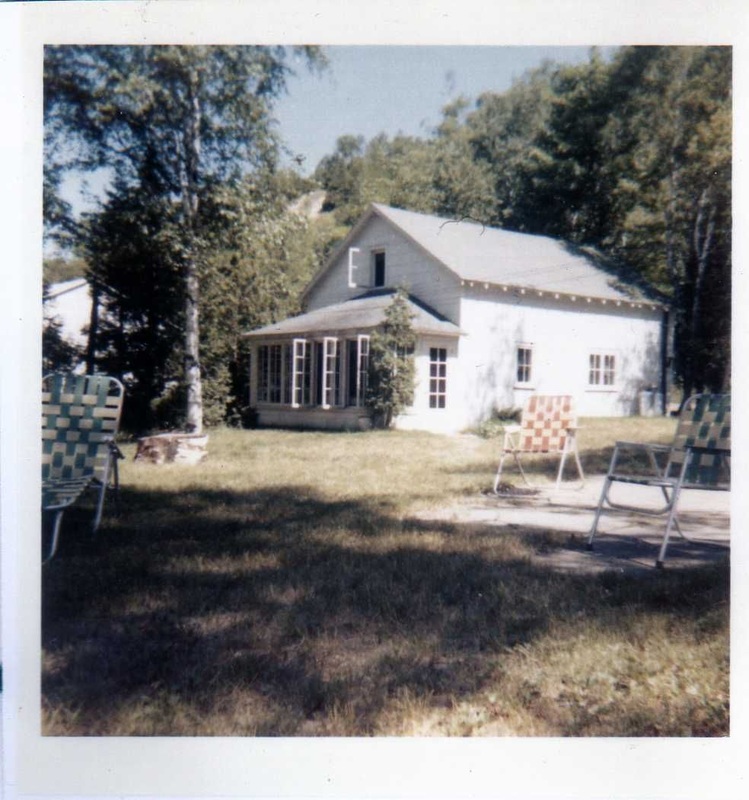When I was about ten, that cottage was sold, but our visits to Beulah continued. I remember visiting Uncle Lewis and Aunt Jane, playing with my older cousins Dorcas, Cherith and Teresa, and walking the two blocks from their house in town to the public beach. I remember filling out a card for the village library so I could check out books - and being amazed when I visited when I was a college student, to find that the library still had that card on file.
When my parents moved to Western Washington in 1975, I continued my studies at Florida State. During my last summer there, I was compelled to write this essay. I think it is significant that I wasn't homesick for Merritt Island, or the new home in Bellevue, Washington. I was homesick for Beulah.
Here's the essay, just as I wrote it, almost 40 years ago:
Beulah Land
My first glimpse of Crystal Lake is always sudden and always breathtaking. As my car winds down the hill from Honor, I can see sailboats on the lake below, and cottages (mostly for summer people) through the trees on the shore. Crystal Lake is well-named; spring-fed, it is a clear, icy blue that is frigid, even in June. The hills surrounding the area on Crystal Downs are deep green and friendly, and silvery poplar leaves flash in the wind.
I go first to the house where Aunt Jane and Uncle Lewis have lived for more than 20 years. Old and faded, it’s been added onto so many times the original building is barely discernible. The porch sags and the kitchen linoleum is uneven in places, but that isn’t noticed when we sit there on summer evenings, absorbed in a game of dominoes.
I especially love mornings in this house – I wake to the sound of my aunt’s footsteps in the kitchen, and to the smell of sausages and pancakes. And there is always a bowl of fresh fruit beside each plate raspberries, peaches, or the famous Michigan cherries. When breakfast is ready, Aunt Jane stands under the grate in the living room ceiling to call me down.
After breakfast Uncle Lew walks the half mile or so to the shop, and sometimes I walk with him. As he points out the house where my great-grandparents, Percy and Mary Reed, lived almost 100 years ago, I wonder: what kind of people were they? Did they love Beulah as much as I do?
The shop (“Reedcraft Weavers – Handwoven Goods”) is a huge whitewashed barn that is set back from the main road on a circular gravel driveway. My grandfather, Maurice L. Reed, began weaving as a hobby in the 1940s, and displayed his woven rugs at a roadside stand. Now the business is carried on by his son-in-law. As I step down into the shop, blinking in the dim coolness, I can hear the loom’s rhythmic thump-jangling in the background. As I wander among the piled rows of rugs and placemats, I feel a definite pride in belonging to this family.
Some mornings I’ll hop into my car and drive along the north shore of Crystal Lake to Point Betsie, on Lake Michigan. I’ll sit in the shade of the lighthouse, leaning against a piece of driftwood to write a letter. Two freighters are steaming past headed perhaps toward Manistee or Sault St. Marie. The waves pound against the shore and I feel altogether contented.
On the day before I leave, I climb the big hill to Benzonia. Here is the graveyard where three generations of Reeds are buried. As I settle myself on the crest of a hill and look across the valley, I think of what John Bunyan wrote in Pilgrim’s Progress:
“…and entering into the Country of Beulah, whose air was very sweet and pleasant, they solaced themselves there for a season. In this country the Sun shineth night and day; here they were within sight of the City they were going to, because it was upon the borders of Heaven.”
Claudia Reed
Tallahassee, Florida, June 1977

 RSS Feed
RSS Feed